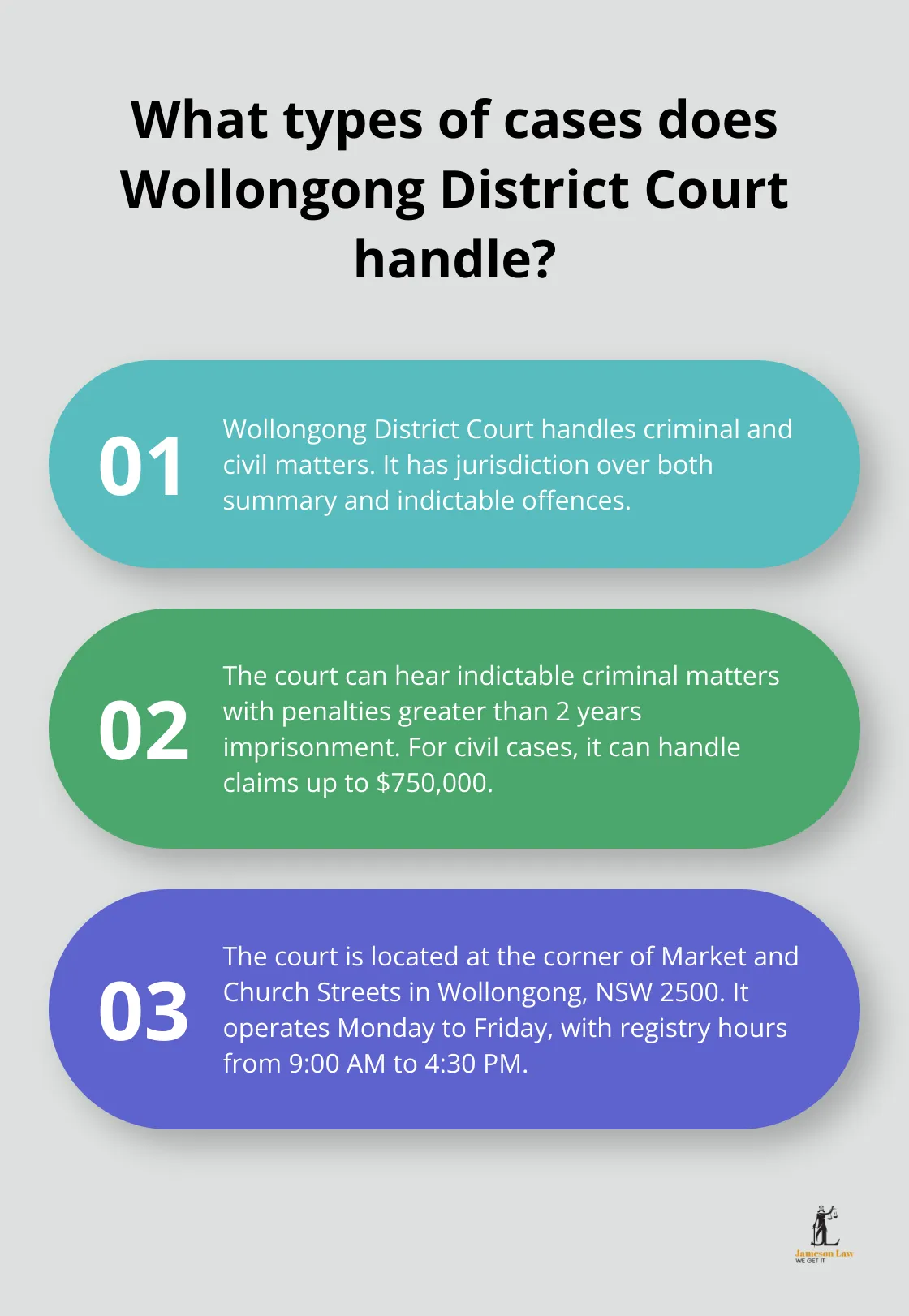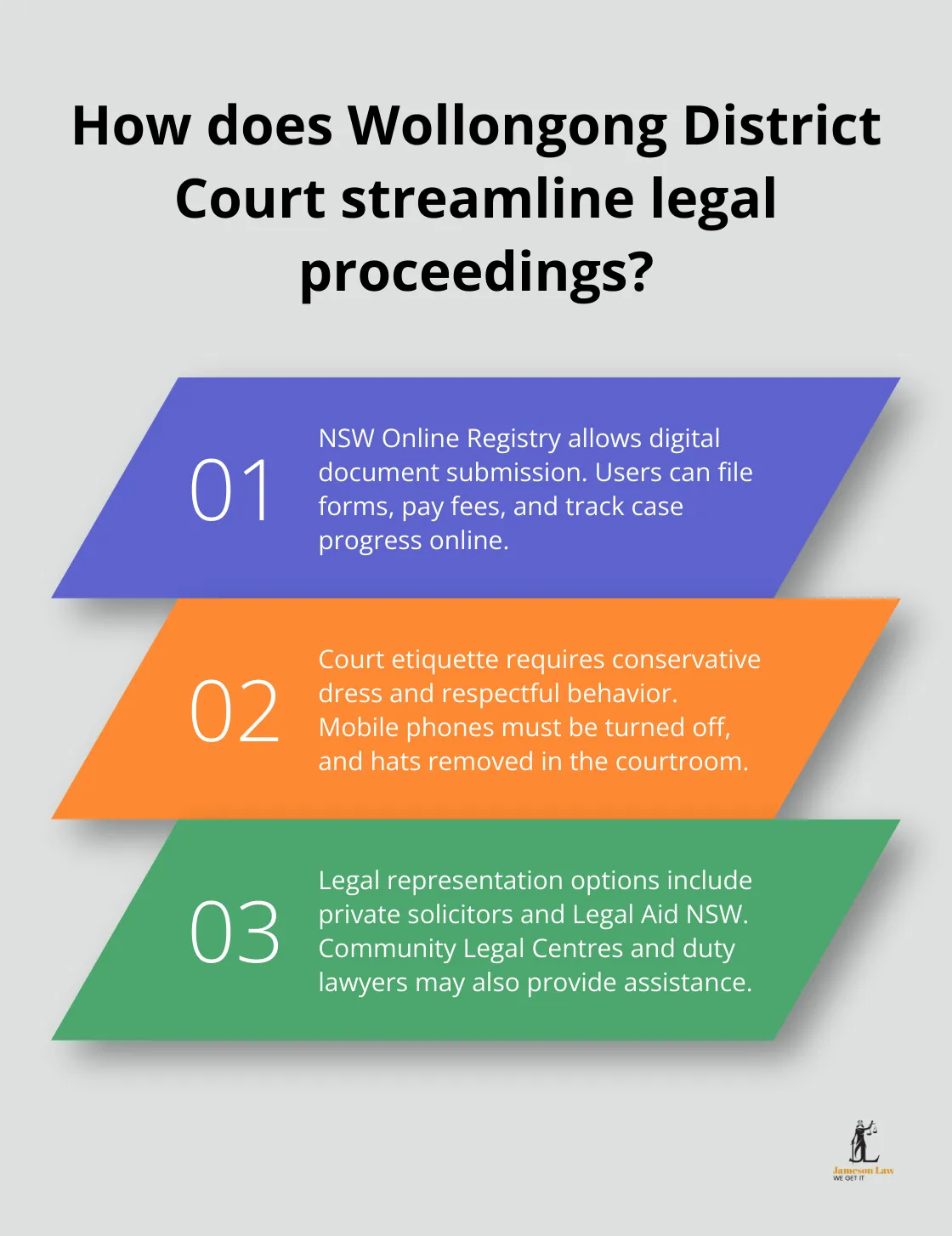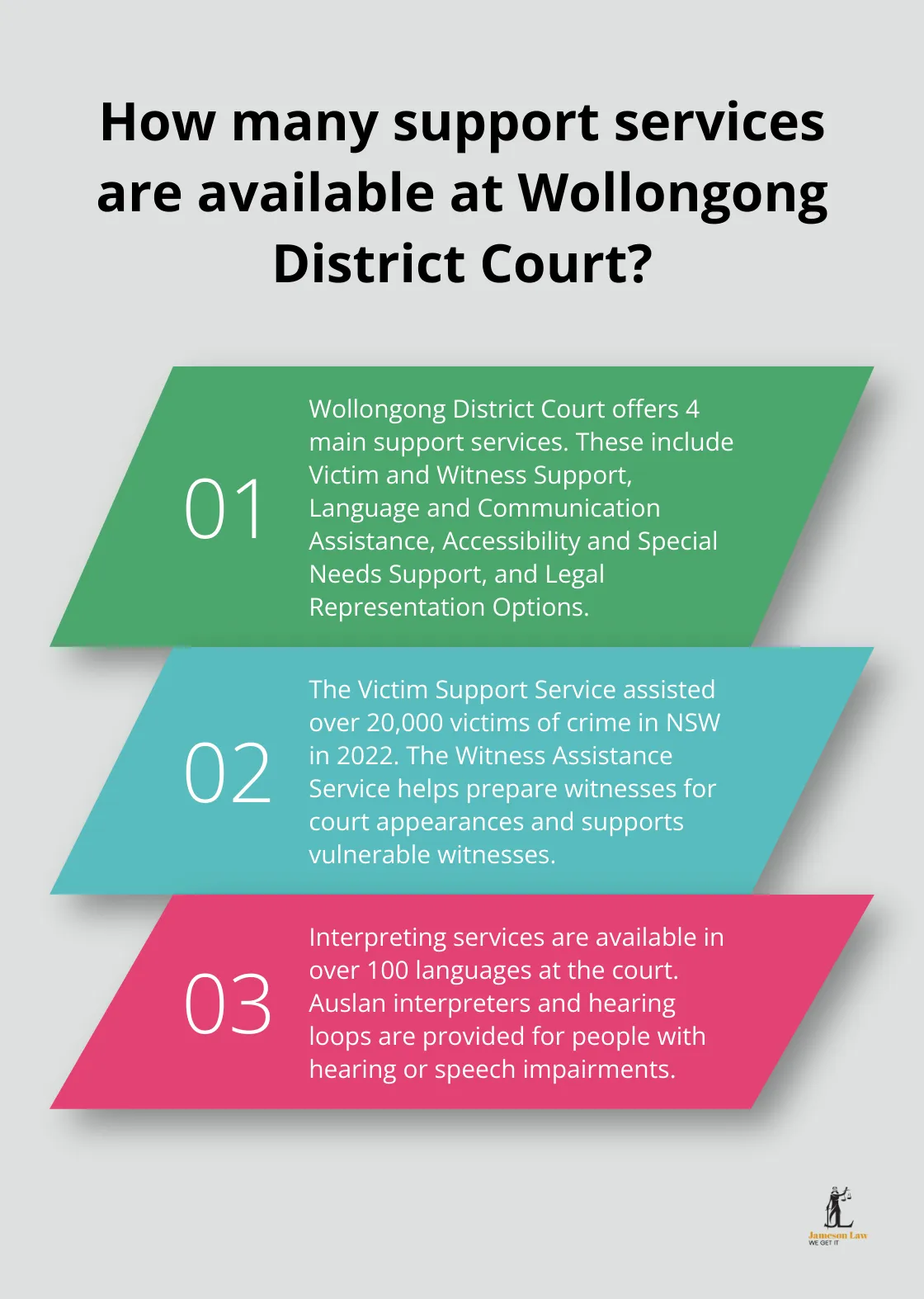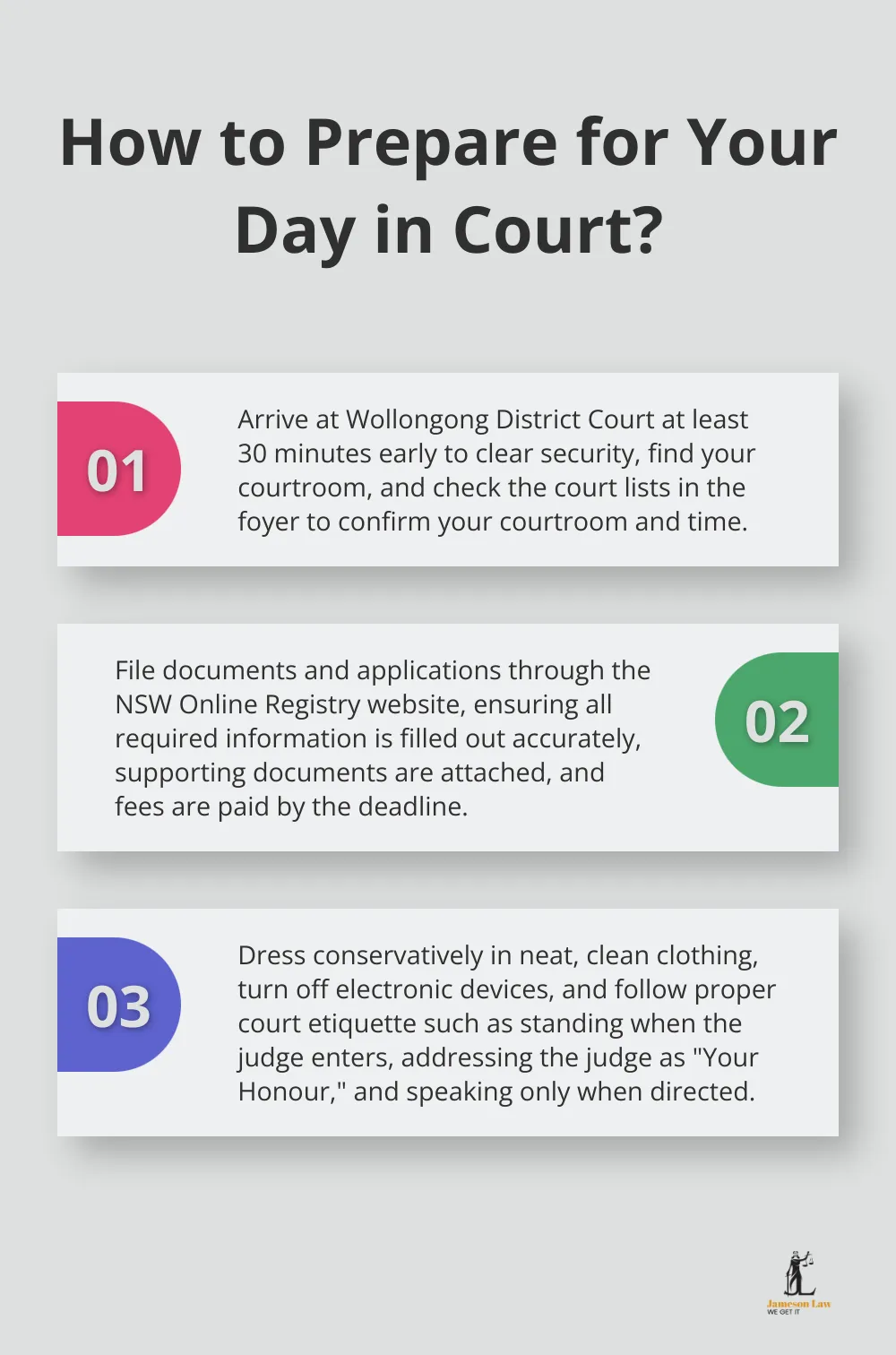Navigating the legal system can be daunting, especially when facing a court appearance. At Jameson Law, we understand the challenges and uncertainties that come with legal proceedings.
This comprehensive guide to Wollongong District Court aims to demystify the court process, providing essential information on procedures, services, and support available. Whether you’re a defendant, witness, or victim, understanding how the court operates will help you feel more prepared and confident.
Wollongong District Court: Location, Cases, and Facilities
Location and Accessibility
Wollongong District Court stands at the corner of Market and Church Streets in Wollongong, NSW 2500. This central location serves residents of the Illawarra region and surrounding areas. The court’s accessibility is enhanced by its proximity to public transport, with bus services along Market Street and a train station on the South Coast Line nearby.
Types of Cases Heard
Wollongong District Court handles a diverse range of legal matters, including criminal and civil matters that are beyond the jurisdiction of the lower courts. The court hears indictable criminal matters and civil cases.

The court has jurisdiction over both summary and indictable offences. Indictable charges are more severe offences than summary charges and generally carry a maximum penalty greater than 2 years imprisonment. For civil matters, it can hear cases with claims up to $750,000, such as motor accident cases.
Court Facilities and Services
Wollongong District Court operates Monday to Friday, with registry hours from 9:00 AM to 1:00 PM and 2:00 PM to 4:30 PM. Regular courtroom procedures typically start at 9:30 AM on weekdays.
The court complex features:
- Multiple courtrooms for civil and criminal matters
- Security measures to ensure safety (arrive early to navigate these procedures)
- Support services, including legal aid and counselling
- A Justices of the Peace (JP) service for document certification
Practical Tips for Court Attendees
When attending Wollongong District Court, consider these tips:
- Dress appropriately to show respect for court proceedings
- Turn off mobile phones in courtrooms
- Use public transport or carpooling (limited street parking available)
- Seek legal advice before speaking to police if facing questioning or charges
Understanding the differences between summary and indictable offences can significantly impact your case. If you’re unsure about your case’s nature or potential consequences, consult a legal professional (Jameson Law offers expert guidance in these matters).
Preparing for Your Court Appearance
To make your court experience smoother:
- Arrive early to navigate security and find your courtroom
- Bring all relevant documentation
- Consider engaging legal representation for complex cases
- Familiarise yourself with court etiquette and procedures
As we move forward, let’s explore the specific court procedures and processes you’ll encounter at Wollongong District Court, ensuring you’re well-prepared for your day in court.
How Court Procedures Work at Wollongong District Court
Filing Documents and Applications
The first step in most legal proceedings involves filing the necessary documents and applications. Wollongong District Court streamlines this process through the NSW Online Registry. This digital platform allows you to submit forms, pay fees, and track your case progress online.

To file documents effectively:
- Create an account on the NSW Online Registry website
- Select the appropriate form for your case type
- Fill out all required information accurately
- Attach any supporting documents
- Pay the required fees
- Submit your application and await confirmation
Meeting all deadlines for document submission is important. Late filings can result in delays or even case dismissals. If you’re unsure about which forms to file or how to complete them, seek legal advice.
Appearing in Court
When your court date arrives, preparation is key to a smooth experience. Here’s what you need to know:
- Arrive at least 30 minutes early to clear security and find your courtroom
- Bring all relevant documents (including your court summons and any filed paperwork)
- Check the court lists displayed in the foyer to confirm your courtroom and time
- Wait quietly outside the courtroom until your case is called
- Stand when the magistrate or judge enters and leaves the courtroom
- Address the magistrate as “Your Honour” and speak clearly when asked
Court proceedings are formal and serious. Maintain a respectful demeanour at all times and follow any instructions given by court staff or the presiding judge.
Court Etiquette and Dress Code
Proper etiquette and dress are essential in court. They demonstrate respect for the legal process and can positively influence how you’re perceived. Follow these guidelines:
Dress Code:
- Wear neat, clean clothing
- Choose conservative styles (no revealing or offensive attire)
- Avoid casual wear like shorts, singlets, or thongs
- Remove hats or sunglasses when entering the courtroom
Etiquette:
- Turn off mobile phones and electronic devices
- No eating, drinking, or chewing gum in the courtroom
- Stand when addressing the court or when the judge enters or leaves
- Speak only when directed by the judge or your legal representative
- Avoid emotional outbursts or disruptive behaviour
Legal Representation Options
While you have the right to represent yourself in court, having legal representation can significantly improve your chances of a favourable outcome. Here are your options:
- Private Solicitor: Hiring a private solicitor gives you personalised legal advice and representation. (Jameson Law offers expertise across various legal areas and can guide you through the entire court process.)
- Legal Aid: If you can’t afford a private solicitor, you may be eligible for Legal Aid NSW. This service provides free or low-cost legal representation to those who meet certain criteria.
- Community Legal Centres: These non-profit organisations offer free legal advice and sometimes representation for those who can’t afford private lawyers.
- Duty Lawyer: For some matters, a duty lawyer may be available at the court on the day of your hearing. They can provide limited advice and representation.
- Self-representation: While possible, this option is generally not recommended for complex cases or serious charges.
When choosing legal representation, consider the complexity of your case, the potential consequences, and your financial situation. Many law firms offer initial consultations to discuss your case and explain your options.
Now that you understand the court procedures in Sydney, let’s explore the various support services available to assist you throughout the legal process.
Support Services at Wollongong District Court
Victim and Witness Support
Wollongong District Court provides essential assistance to victims of crime and witnesses. The Victim Support Service offers emotional support, information about court procedures, and assistance with victim impact statements. In 2022, over 20,000 victims of crime accessed support services in NSW (according to the NSW Bureau of Crime Statistics and Research), which underscores the importance of these programs.

The Witness Assistance Service, operated by the Office of the Director of Public Prosecutions, helps witnesses prepare for court appearances. They explain court processes, arrange court familiarisation visits, and provide support during trials. This service is particularly valuable for vulnerable witnesses (such as children or those with disabilities).
Language and Communication Assistance
Wollongong District Court offers professional interpreting services for those who need language support. These services are free and available in over 100 languages. To request an interpreter, you must contact the court registry at least two weeks before your court date to ensure availability.
The court also provides assistance for people with hearing or speech impairments. This includes Auslan interpreters and hearing loops in courtrooms. You should notify the court registry when filing your documents or as soon as possible before your court date if you require these services.
Accessibility and Special Needs Support
Wollongong District Court ensures access for people with disabilities. The building features wheelchair-accessible entrances, lifts, and toilets. You should contact the court registry in advance to arrange appropriate assistance if you have specific mobility needs.
For individuals with intellectual disabilities or mental health issues, the court can provide support workers or arrange for a support person to accompany you during proceedings. The Cognitive Impairment Diversion Program (available in some NSW courts) offers specialised support for eligible individuals with mental health impairments and/or cognitive impairments facing criminal charges.
Legal Representation Options
While you have the right to represent yourself, having legal representation can significantly improve your chances of a favourable outcome. Your options include:
- Private Solicitor: Hiring a private solicitor gives you personalised legal advice and representation.
- Legal Aid: If you can’t afford a private solicitor, you may qualify for Legal Aid NSW.
- Community Legal Centres: These non-profit organisations offer free legal advice and sometimes representation.
- Duty Lawyer: For some matters, a duty lawyer may be available at the court on the day of your hearing.
When choosing legal representation, consider the complexity of your case, potential consequences, and your financial situation. Many law firms (including Jameson Law) offer initial consultations to discuss your case and explain your options.
Final Thoughts
The legal system presents many challenges, but understanding Wollongong District Court processes empowers individuals involved in legal matters. Wollongong District Court provides resources to assist throughout your legal journey, including victim support services, language assistance, and accessibility options. These programs ensure fair access to justice for all individuals.

Every legal situation requires a unique approach. The complexities of law and court procedures often necessitate professional guidance. Seeking expert legal advice can significantly improve your chances of a favorable outcome in your case.
Jameson Law specialises in various areas of law, including personal injury, criminal defense, and family law. Our team of experienced lawyers (committed to achieving the best possible outcomes for our clients) can provide tailored legal support for your Wollongong District Court proceedings. Contact us for expert advice to prepare for your court appearance or understand your legal rights and options.













